Back in 1984, Roland Joffe accomplished the near impossible; his major motion picture debut, The Killing Fields, defied every expectation typically associated with neophyte filmmakers and what Joffe delivered was one of the most powerful and moving films I've ever seen. So it's no surprise I highly anticipated his follow-up film, The Mission, and it's obvious that by bringing back the same team (producer David Puttnam, cinematographer Chris Menges, and editor Jim Clark), they attempted to capture the proverbial "lightning in a bottle" a second time. Unfortunately, the end product isn't quite cinematic magic.
Set in the 18th century, Jeremy Irons stars as Father Gabriel, one of several Spanish Jesuit priests (including Liam Neeson) assigned to convert the Guarini tribe of South America into Christians. His efforts are gradual, but successful. Converging with this story is Rodrigo Mendoza (Robert De Niro), a slave trader who seeks penance after killing his own brother in a fit of rage. For all the Guarini that he has killed or sold off into slavery, they still show compassion and forgiveness towards him, and he is accepted into the mission, even converting into a Jesuit priest under the guidance of Father Gabriel.
The priests and the Guarini natives eventually find themselves in heated discussion with politicians and slave-owners, who are debating over whether the mission should fall under the rule of Portugal, thus endangering all the Guarini with the possibility of being made into slaves. Determined to prevent such an action at any cost, Mendoza takes up his sword once more, coming into conflict with Father Gabriel's peaceful approach.
The Mission was released in 1986 with little success in theaters, despite garnering a respectable 7 Oscar nominations, including Best Picture. Since then, it's developed a devoted fan base who consider it among the most underrated films of the decade. As much as I'd like to, I can't quite agree. Though a respectable and often beautifully crafted effort, the film ultimately comes up short in human interest and emotions, with Joffe often favoring lingering shots of lush jungle scenery and needlessly overlong political machinations involving secondary characters whom we couldn't care less about.
The film is divided into three acts, the first, involving the spiritual transformation of Mendoza, is easily the most compelling. Despite De Niro's occasionally stilted performance (his delivery of some of the dialogue, particularly "Are you laughing at me?" still makes me cringe), his emotional torment is heartfelt and absorbing and his acceptance into the mission is genuinely moving. It's almost all downhill from there.
The build-up in the second act is initially effective, with the heated debate over the Guarini engrossing, but the conflict eventually loses steam when we're subjected to dull, endless dialogue that grows inadvertently confusing even as it intends to clear up the matters at hand. It's also in the middle segment the film loses its human focus and all that's really left is the question of will they or won't they fight.
The third act is the inevitable battle, and while there are a few powerful moments amidst the chaos, the sequence is a badly choreographed mess. The editing also feels a little rough, with quite a few scenes feeling like they clocked in a little too soon (the sudden transition after Irons' "God is love!" line is disjointed, to say the least). The Guarini are never developed beyond the typical "noble savage" portrayal, so it's difficult to feel for their plight beyond the fact that their forced subjugation and mass slaughter is a heinous crime. I wanted to feel more for them, but they're merely a backdrop for the more seasoned cast.
As Father Gabriel, Jeremy Irons is superb, unquestionably one of the film's consistent bright spots. It's unfortunate he's never that well-developed in any of the film's separate acts, but his performance alone is able to draw us in even if the script lets him (and the audience) down. In supporting roles, Ray McAnally and Liam Neeson are excellent, though a bit limited in screen time. For Neeson, this was more of a hint of greater things to come.
Ennio Morricone's score deserves a special mention; whatever emotions Joffe is unable to convey on screen, Morricone's music can conjure in just a few notes. It's one of the most beautiful scores I've had the pleasure to listen to, especially in segments with oboe and flute. The chorus in the background is perhaps a bit much, but an overpowering score can do wonders in a film otherwise unable to muster all the intended emotions.
Joffe's work in the film is still overall quite solid, but he completely lost his footing soon afterward, losing a grip on his career with a long string of critical and financial disasters, including Super Mario Bros., The Scarlet Letter, and Goodbye Lover. I'm convinced The Killing Fields was not a fluke, but the sign of a genuine auteur who showed his prowess thanks to a brilliant script and cast. Blend those two elements with his natural skills and I'm sure we'll get a film worthy of mention alongside his debut. Let's just hope this happens sooner rather than later.
All reviews -
Movies (53)
The Mission review
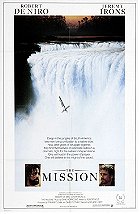 Posted : 10 years, 7 months ago on 28 November 2014 11:16
(A review of The Mission)
Posted : 10 years, 7 months ago on 28 November 2014 11:16
(A review of The Mission) 0 comments, Reply to this entry
0 comments, Reply to this entry
The Shining review
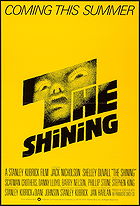 Posted : 11 years ago on 1 July 2014 12:29
(A review of The Shining)
Posted : 11 years ago on 1 July 2014 12:29
(A review of The Shining)Alive with portent and symbolism, every frame of the film brims with Kubrick's genius for implying psychological purpose in setting: the hotel's tight, sinister labyrinth of corridors; its cold, sterile bathrooms; the lavish, illusionary ballroom. This was horror of the mind transposed to place (or, indeed, vice versa). The clarity of the photography and the weird perspectives constantly alluding to Torrance's twisted state of mind...Ostensibly a haunted house story, it manages to traverse a complex world of incipient madness, spectral murder and supernatural visions ...and also makes you jump.
 0 comments, Reply to this entry
0 comments, Reply to this entry
American Psycho review
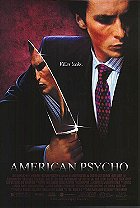 Posted : 11 years ago on 1 July 2014 12:28
(A review of American Psycho)
Posted : 11 years ago on 1 July 2014 12:28
(A review of American Psycho)Harron asked what's more unnerving - the exaggerated violence some imagine or the vacuous reality some want to be real, psychosis as much in the construct as the character. Fashion and music change, but not the debasing aspects of image-forming. What's deemed sexy often is unattainable. "Psycho's" playfully perverse climactic confession - a David Lynchian nightmare where even the buildings swallow Bateman up - made that painfully, bleakly clear.
 0 comments, Reply to this entry
0 comments, Reply to this entry
Punch-Drunk Love review
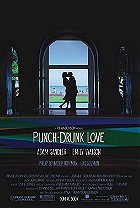 Posted : 11 years ago on 1 July 2014 12:26
(A review of Punch-Drunk Love)
Posted : 11 years ago on 1 July 2014 12:26
(A review of Punch-Drunk Love)Odd, touching, and unique, Punch-Drunk Love is also delightfully funny, utilizing Adam Sandler's comic persona to explore the life of a lonely guy who finds love. This is a surprisingly tender film wrapped in a terrifying black dramedy and a triumph from America's most promising young director.
 0 comments, Reply to this entry
0 comments, Reply to this entry
Groundhog Day review
 Posted : 11 years ago on 1 July 2014 12:26
(A review of Groundhog Day)
Posted : 11 years ago on 1 July 2014 12:26
(A review of Groundhog Day)The most horrible thing about life is not knowing what's going to happen next. Or at least that's what we have thought up till now. But Groundhog Day, Harold Ramis's brilliantly imaginative, wildly funny new comedy starring Bill Murray, demonstrates that there is something even more horrible - knowing exactly what's going to happen next.
 0 comments, Reply to this entry
0 comments, Reply to this entry
Seven review
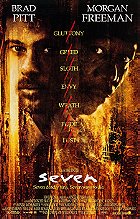 Posted : 11 years ago on 1 July 2014 12:24
(A review of Seven)
Posted : 11 years ago on 1 July 2014 12:24
(A review of Seven)Serial killers and mismatched cops overcoming antagonism are seldom fresh, fruitful subjects for movies, but this exceptionally nasty thriller blends genres to grim and gripping effect...The film's world is so shadowy, decaying and intentionally dated that one often wonders whether anyone involved has heard of electricity; at the same time, however, Somerset and Mills' slow voyage from claustrophobic murk into blinding light makes for a vivid dramatic metaphor. Moreover, Fincher handles the violence with sensitivity, announcing its obscenity in spoken analyses and briefly glimpsed post mortem shots, but never showing the murderous acts themselves.
 0 comments, Reply to this entry
0 comments, Reply to this entry
Beauty and the Beast review
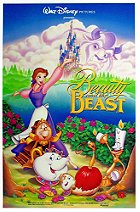 Posted : 11 years ago on 1 July 2014 12:22
(A review of Beauty and the Beast)
Posted : 11 years ago on 1 July 2014 12:22
(A review of Beauty and the Beast)"Beauty and the Beast" is one of the films to put Disney on the map. With a tale as old as time, this fairytale is more believable than most of the animations that come from this studio. Having a down-on-her-luck girl being wanted by a man who she despises, she gives up her life to save her father, where she finds herself confronted with a scary beast. The destiny of the film unfolds and will warm everyone's heart while watching it unravel. It's a film that will never falter or fail to impress, no matter how many times you watch it. With perfect writing and a story that will be remembered forever, "Beauty and the Beast" is one of the best Disney films out there to date!
 0 comments, Reply to this entry
0 comments, Reply to this entry
Night of the Living Dead review
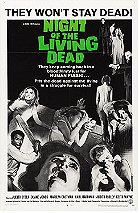 Posted : 11 years ago on 1 July 2014 12:21
(A review of Night of the Living Dead)
Posted : 11 years ago on 1 July 2014 12:21
(A review of Night of the Living Dead)"Night of the Living Dead came out of nowhere, or to be more precise, Pittsburgh, and turned into the most influential horror film since Psycho. George Romero's remarkably assured debut deflates all genre clichés. It traded the expressionistic sets of the traditional fright flick for a neorealistic style - Romero's use of natural locations and grainy black and white gave his gorefest the look and feel of a doc... This was Middle America at war, and the zombie carnage seemed a grotesque echo of the conflict then raging in Vietnam."
 0 comments, Reply to this entry
0 comments, Reply to this entry
Amélie review
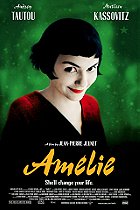 Posted : 11 years, 9 months ago on 5 October 2013 10:20
(A review of Amélie)
Posted : 11 years, 9 months ago on 5 October 2013 10:20
(A review of Amélie)It is a rare thing to have an illuminating experience whilst watching a film, but that is exactly what is encountered with Amelie. This film is quirky and eccentric with its surrealistic sensibilities and loony characters, but never comes off as pretentious; funny and cheeky, but never resorting to immature stabs at humour. All of this is anchored by a touching lead performance from Audrey Tautou, the extremely cute, petite French actress a superb casting choice, who was more than able to bring forth her characters' complexities, eccentricities, and above all, loving warmth.
 0 comments, Reply to this entry
0 comments, Reply to this entry
The Trial (1962) review
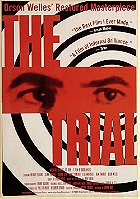 Posted : 11 years, 11 months ago on 19 July 2013 03:37
(A review of The Trial (1962))
Posted : 11 years, 11 months ago on 19 July 2013 03:37
(A review of The Trial (1962))Orson Welles's The Trial is one disturbing, but hauntingly beautiful film. After years of having studio interference with many of his movies from the Magnificent Ambersons onwards, Welles finally had complete control and (admittedly) really went for broke with this film! It's about as opposite from a mainstream studio film as you'll ever find, with a constantly wandering narrative that really goes nowhere for long stretches. But this all works in its on wonderfully weird way as Welles captures the feeling that Josef K really is in the middle of a terrible nightmare. Is it all really happening, or is it all in his imagination? The black and white cinematography is quite simply, some of the best ever put to celluloid. Anthony Perkins is outstanding in the lead role. This is definitely his best role after Norman Bates. The Trial is certainly not a film for everyone. But if you want to see something a little different, from one of the greatest filmmakers of all time, then check it out!
Orson Welles proudly proclaims with abandon "I don't care what anyone says, this is my best film" and for once the silent chancellors are unanimous. Yes, this is better than Citizen Kane, A touch of Evil, The magnificent Ambersons, it's better than most silent films. There is a cautious freedom of movement in its storytelling, a strange and eerie personal touch in every frame of the film. It is unmistakably freed of any cinematic constraints that might limit its potency yet it proceeds with the tact and whimsy of an emancipated slave. This is the film Welles never should have made in his career post Citizen Kane, but ended up making without the greasy infringement of the 'higher influential forces' within the film industry. It is also the most accurate depiction of the obstacles of filmmaking.
Orson Welles proudly proclaims with abandon "I don't care what anyone says, this is my best film" and for once the silent chancellors are unanimous. Yes, this is better than Citizen Kane, A touch of Evil, The magnificent Ambersons, it's better than most silent films. There is a cautious freedom of movement in its storytelling, a strange and eerie personal touch in every frame of the film. It is unmistakably freed of any cinematic constraints that might limit its potency yet it proceeds with the tact and whimsy of an emancipated slave. This is the film Welles never should have made in his career post Citizen Kane, but ended up making without the greasy infringement of the 'higher influential forces' within the film industry. It is also the most accurate depiction of the obstacles of filmmaking.
 0 comments, Reply to this entry
0 comments, Reply to this entry
 Login
Login
 Home
Home 26 Lists
26 Lists 53 Reviews
53 Reviews Collections
Collections